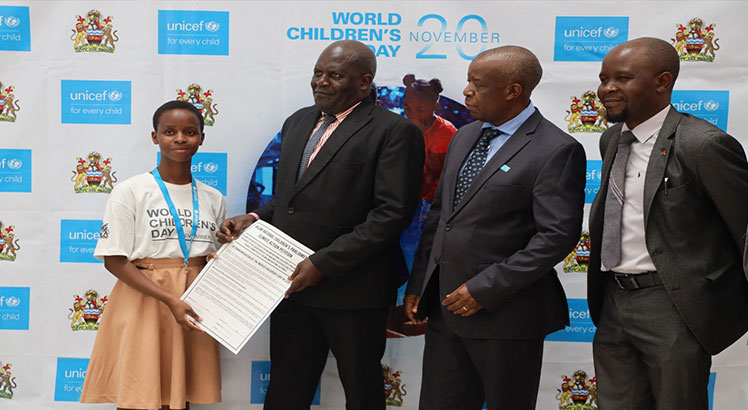Children push for climate justice
Representatives of the National Children’s Parliament have asked government to step up climate action and facilitate the participation of children and the youth in actions aimed at addressing climate change issues.
Presenting their petition to members of Parliament in Lilongwe yesterday as part of World Children’s Day commemorations, the National Children’s Parliament members further called for stronger climate laws and policies to protect children from adverse effects of climate change.
Reading the petition on behalf of her fellow members, National Children Parliament First Deputy Speaker Shekina Galuwapananji said the theme for the day, ‘Climate crisis is a child rights crisis’ underpins the message that the climate crisis affects the rights of children across all areas of their lives.
In the petition, the children also called for the incorporation of climate change and environmental education in the school curriculum to give children and young people the knowledge and skills to protect the environment and contribute towards a safe and climate change-free future.

Reads the petition in part: “We call for the promotion of meaningful participation of children and youth in climate change processes at home, school, in the community, and at district and national levels. The children must also participate at the decision-making level and funds be set aside to allow the adoption of the measures.”
Speaker of Parliament Catherine Gotani Hara said engagements with child parliamentarians are crucial as they foster policy changes and provide insights into matters that concern children.
She said the most severely affected by these unfavourable weather events and the climate crisis are children, as the occurrences, not only rob them of their childhood, but also intensify enduring deprivations in their lives.
The National Children Parliamentarians’ engagement with Parliament was facilitated by Unicef Malawi.
On his part, Unicef country representative Shadrack Omol said frequent extreme weather events, food and water shortages, and the increased transmission of diseases caused by climate change are heightening existing social and economic inequalities and threatening to reverse progress towards improving children’s well-being.
Minister of Gender, Community Development and Social Welfare Jean Sendeza said such engagements with children provide invaluable insights into their needs and experiences, allowing authorities to identify areas where they can make a positive impact and create a better environment for their growth and development.
Malawi is ranked fifth on the 2021 Global Climate Risk Index, and 40th on Unicef when it comes to climate-risk scale.
According to a 2021 World Bank report on global climate risk, Malawi has witnessed over 39 flood events and 15 epidemics over a period of 43 years (1980-2023). Additionally, there has been a temperature rise of 1°C in the last 120 years (1901-2021) globally which has also affected Malawi.
The World Children’s Day was first established in 1954 as a Universal Children’s Day and is celebrated on November 20 to promote international togetherness around children’s rights, and improve children’s welfare.





